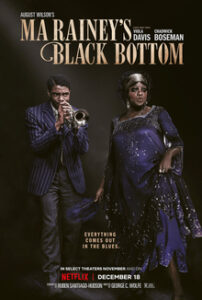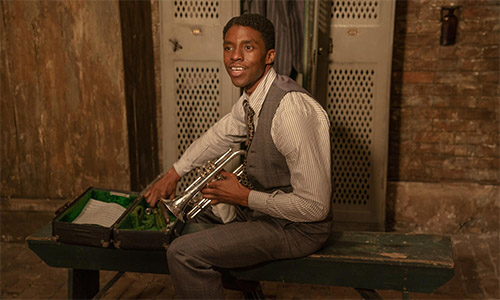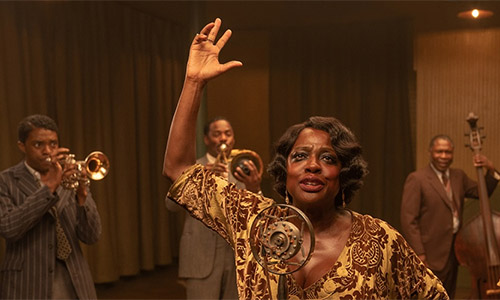 As I write this post today, it has been just hours since the Academy of Motion Picture Arts and Sciences named its nominees for The 93rd Academy Awards, recognizing the best of what may have been its most unique year. 2020 was a pretty dreadful year all around. It was my most challenging, trying, and somber year. I’ve mentioned quite a few times in other reviews that most of the big blockbusters that were initially scheduled to be released were delayed to 2021 in hopes that the end of the COVID-19 pandemic would signal a return of moviegoers to the theaters. The jury is still out on each of these. Indeed, some theaters that closed their doors back in March of 2020 will never open their doors again. Others will see far less patronage because many movies have Video on Demand releases on the same day or shortly after their theatrical release.
As I write this post today, it has been just hours since the Academy of Motion Picture Arts and Sciences named its nominees for The 93rd Academy Awards, recognizing the best of what may have been its most unique year. 2020 was a pretty dreadful year all around. It was my most challenging, trying, and somber year. I’ve mentioned quite a few times in other reviews that most of the big blockbusters that were initially scheduled to be released were delayed to 2021 in hopes that the end of the COVID-19 pandemic would signal a return of moviegoers to the theaters. The jury is still out on each of these. Indeed, some theaters that closed their doors back in March of 2020 will never open their doors again. Others will see far less patronage because many movies have Video on Demand releases on the same day or shortly after their theatrical release.
Some will have realized that they enjoy watching their movies at home and can often do so at a lower price than going to the theater. I like both. I do enjoy going to the theater. Nothing is as cinematically exhilarating as seeing a great movie on the largest screen. Couple that with Dolby Surround Sound and a packed theater going through the same experiences and feeling similar emotions to you simultaneously, making for a great environment. However, watching a terrible movie on the big screen is dreadful, especially if the theater is relatively empty, allowing you to look at your phone. With a home viewing, you can piece together a lousy movie in segments if you choose to complete the viewing process. In a theater, you are forced to suffer. Sure, you could always leave, but something about that affects me more. It’s admitting that you made a bad decision in front of whoever else might be in the theater. It’s a version of a walk of shame if you will.
Returning to the films of 2020, The Academy extended its windows of movies eligible for awards by two months. In other years, a film needed a theatrical release (in some fashion) by December 31st of the year it would like to be eligible for. For 2020, the release date was pushed back until February 28th. This resulted in, among many other things, more eligible movies than ever before. However, quantity didn’t necessarily ensure quality. In fact, quite the opposite was true. 2020 was an abysmal year for film. I thought 2019 was a poor year as well, though my favorite movie of the year (1917) far exceeded News of the World, my expected favorite film of 2020.
However, there were more than a few films that felt very timely. Others felt very timeless. Those are two positives on a year that offered some very creative, ambitious, and thought-provoking movies, even if those movies felt more good than great. The timely ones included Promising Young Woman, Da 5 Bloods, Minari, Judas and the Black Messiah, and One Night in Miami.. I enjoyed the first two, though Minari, Judas, and the Black Messiah were overrated. I appreciated and understood the essence of One Night in Miami. However, it did not play out as well on the screen as it may have as a live performance play.
While George C. Wolfe’s (Nights in Rodanthe) Ma Rainey’s Black Bottom was adapted from a 1982 play of the same name written by August Wilson, a particular wow factor made this film stand out on screen, whereas One Night in Miami blended away. And that wow factor was through the performances of its leads. However, there was more deliberation and higher execution in Ma Rainey’s Black Bottom than in One Night in Miami. Both movies occur over about a day (or, in the latter’s case, a night). Ma Rainey’s Black Bottom had much more of a sequential flow. Many important issues and ensuing conversations were raised in One Night in Miami. But as quickly as a character introduced an issue, it was concluded rapidly to move to another hot topic of the day. It felt very broken, though this may have been expected given the material it wanted to convey over a runtime. Ma Rainey’s Black Bottom didn’t run into that problem. It didn’t try to do too much. Ambitious is the wrong word because both movies had a lot to say. Ma Rainey’s Black Bottom had much cleaner and more concise storytelling. It made for both a better and more entertaining film.

The Academy got it right when it comes to this movie. It received four Oscar nominations (Actor in a Leading Role, Actress in a Leading Role, Production Design, and Makeup and Hairstyle). I would have been displeased had this movie earned an Oscar for Best Picture or Best Director. Still, I would have been even more upset if either Viola Davis (Fences, Doubt) didn’t earn her fourth Oscar nomination for acting or Chadwick Boseman (Black Panther, 42) didn’t earn his first posthumously. Both are incredibly deserving in a year where the outstanding lead performance nominees are as good of a group as they have been in the last half-decade.
While I have yet to look online to see who the favorites are to win, I do think that, with all things else being equal, Boseman will likely win the award. His performance as the brash, skirt-chaser Levee will leave you speechless. This short-tempered but loveable trumpeter has dreams of recording his music. Seemingly thwarted at every stop, Levee thinks he has made it to the big time as a Ma Rainey’s (Davis) band member. He has plans to invoke his sound into Ma’s arrangements, something that bandmates Cutler (Colman Domingo – If Beale Street Could Talk, The Birth of a Nation), Toledo (Glynn Turman – Super 8, Men of Honor), and Slow Drag (Michael Potts) don’t see happening. It’s Ma’s show, and the four men are simply her players. Three of the men are keenly aware of that. But Levee doesn’t necessarily agree.
In her boisterous voice, Davis’s Ma does the one thing you didn’t think she could do to Boseman’s Levee. She upstages him. Viola Davis is a true American treasure. Boseman may well have been on his path to her kind of stardom. Heck, he may have already reached that by the time he passed away from colon cancer at the young age of 43. Boseman steals the show…that is for all of the time that he’s not on the screen with Davis. Davis and Boseman are clearly the lead actors and actresses in this movie, and while both get their fair share of screen time, this is slightly more about Levee’s failed American Dream than Ma’s achieving of it.
This movie takes place in the mid-1920s. Ma Rainey (aka The Mother of Blues) and her band are successfully touring the southern and midwestern United States. They stop for a break in Chicago, where Ma’s manager, Irvin (Jeremy Shamos – The Big Sick, Birdman), has booked a studio for the group to record some new material. Ma’s demands make Mel (Johnny Coyne – African Gothic, Beruit), the studio’s owner, worried that booking Ma wasn’t the best idea. Her bigger-than-life presence brings with it a list of demands. She’ll sing only when she feels like it and will perform her songs only the way that suits her. What Irvin, Mel, or Levee thinks doesn’t matter. She is their meal ticket, and she is aware of it. She’s a diva because she has no one in her life who can say no to her, and she knows it. The movie consists of clashes between our two lead characters and everyone around them. There are no protagonists or antagonists in this day-long event. There aren’t even shades of good and evil. These are just people going through their lives, trying to do the right thing while also understanding they are human. No one is out to hurt another intentionally. We do, however, have characters whose pasts have been damaged.

Once again, Boseman was beyond captivating. His performance was better than any of the nominees in 2017 or 2019 (2018 had some great performances). The problem for Boseman is that he’ll be competing against Anthony Hopkins (who gave the performance of his legendary career in The Father) and newcomer Riz Ahmed, who delivered a knockout punch of his own in Sound of Metal. The other two nominees are fan-favorite Gary Oldman (Mank) and Steven Yeun (Minari), who became the first Asian American actor nominated for a Lead Role Oscar. There could be some unpleasant social media banter if Hopkins or Oldman wins the award over Boseman, Ahmed, or Yeun. I was blown away by the performances of Ahmed and, particularly, Hopkins, whose films I generally don’t enjoy.
As for Davis, her road to her second Oscar might be just as challenging. This year’s competition in her award category is far from her Best Supporting Actress landslide win in 2016’s Fences, which ironically was a film adaptation of an August Wilson play. My only beef was that I thought she should have been up for Best Lead Actress in that movie. She stood toe to toe and blow for blow with Denzel Washington in one of my favorite stage-to-film adaptations of all time. Not to lessen her victory or the award, but I believe she would have won Best Lead Actress for that performance. This year, her biggest threats will be Frances McDormand (Nomadland) and Carey Mulligan (Promising Young Woman). Like the Best Actor award, many who take home the grand prize will be an old school (Davis, McDormand movies) or a new school (Mulligan and upstart Andrea Day – The United States vs. Billie Holiday) mentality. Vanessa Kirby was excellent in Pieces of a Woman but feels like a distant fifth. This is a three-horse race between Mulligan, Davis, and McDormand. I would rank the three performances in that order.
Ma Rainey’s Black Bottom will invoke memories of Death of a Salesman, perhaps the most iconic of all American plays, ironically playing on themes of the failed American Dream. While stage-to-screen adaptations aren’t my favorite, as I constantly imagine how the movie would look performed live, Ma Rainey’s Black Bottom had me doing that far and fewer times than the likes of One Night in Miami, August: Osage County, Fences, Blackbird, or Carnage.
Plot 8/10
Character Development 8/10
Character Chemistry 9/10
Acting 9.5/10
Screenplay 8/10
Directing 9/10
Cinematography 10/10
Sound 10/10
Hook and Reel 9/10
Universal Relevance 9/10
89.5%
Movies You Might Like If You Liked This Movie
- Dreamgirls
- Chicago
- Fences
- What’s Love Got To Do With It?
- Porgy And Bess